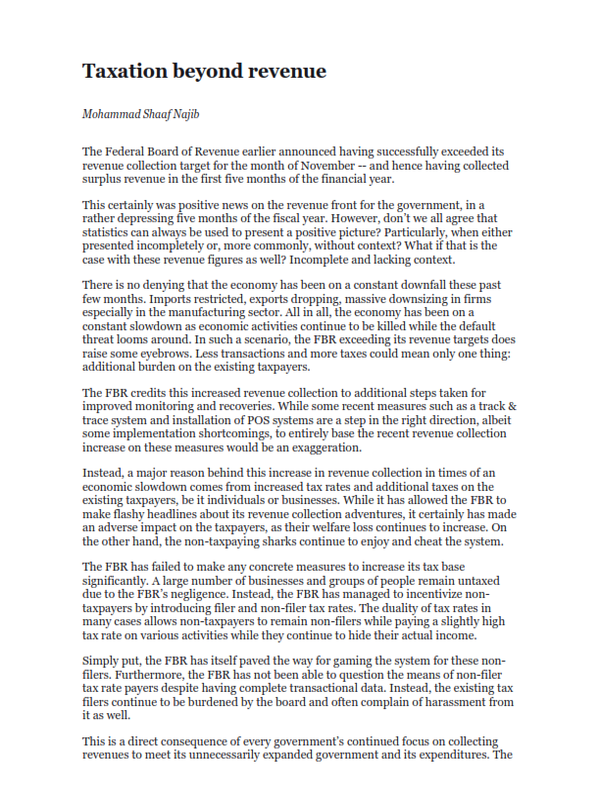
Pakistan Institute of Development Economics
- Home
Our Portals
MenuMenuMenuMenuMenuMenuMenu - ResearchMenuMenuMenuMenuMenuMenuMenu
- Discourse
- The PDR
- Our Researchers
- Academics
- Degree Verification
- Thesis Portal
- Our Portals
Taxation beyond revenue
The Federal Board of Revenue earlier announced having successfully exceeded its revenue collection target for the month of November — and hence having collected surplus revenue in the first five months of the financial year.
This certainly was positive news on the revenue front for the government, in a rather depressing five months of the fiscal year. However, don’t we all agree that statistics can always be used to present a positive picture? Particularly, when either presented incompletely or, more commonly, without context? What if that is the case with these revenue figures as well? Incomplete and lacking context.
There is no denying that the economy has been on a constant downfall these past few months. Imports restricted, exports dropping, massive downsizing in firms especially in the manufacturing sector. All in all, the economy has been on a constant slowdown as economic activities continue to be killed while the default threat looms around. In such a scenario, the FBR exceeding its revenue targets does raise some eyebrows. Less transactions and more taxes could mean only one thing: additional burden on the existing taxpayers.
The FBR credits this increased revenue collection to additional steps taken for improved monitoring and recoveries. While some recent measures such as a track & trace system and installation of POS systems are a step in the right direction, albeit some implementation shortcomings, to entirely base the recent revenue collection increase on these measures would be an exaggeration.
Instead, a major reason behind this increase in revenue collection in times of an economic slowdown comes from increased tax rates and additional taxes on the existing taxpayers, be it individuals or businesses. While it has allowed the FBR to make flashy headlines about its revenue collection adventures, it certainly has made an adverse impact on the taxpayers, as their welfare loss continues to increase. On the other hand, the non-taxpaying sharks continue to enjoy and cheat the system.
The FBR has failed to make any concrete measures to increase its tax base significantly. A large number of businesses and groups of people remain untaxed due to the FBR’s negligence. Instead, the FBR has managed to incentivize non-taxpayers by introducing filer and non-filer tax rates. The duality of tax rates in many cases allows non-taxpayers to remain non-filers while paying a slightly high tax rate on various activities while they continue to hide their actual income.
Simply put, the FBR has itself paved the way for gaming the system for these non-filers. Furthermore, the FBR has not been able to question the means of non-filer tax rate payers despite having complete transactional data. Instead, the existing tax filers continue to be burdened by the board and often complain of harassment from it as well.
This is a direct consequence of every government’s continued focus on collecting revenues to meet its unnecessarily expanded government and its expenditures. The FBR is used in severe desperation to increase revenues for financing government inefficiencies, without paying any heed to where the revenue is being generated from and its impact on the overall economic transactions in the country. As a result, Pakistan’s tax regime is highly dependent on indirect taxes and a continually expanding withholding regime.
Despite having thousands of employees, the FBR has turned a large number of the general public into withholding agents, and shifted the responsibility of tax collection from the department itself to the general public. Soon enough, if not stopped in time, the FBR might end up turning the entire population into a withholding agent one way or the other.
It is high time the government and FBR both realized that there is a tax system beyond just the revenue. The focus must be shifted from just collecting revenue, to collecting revenue without hampering economic transactions in the economy. Instead, the tax system must develop trust and faith among the economic agents and encourage transactions. The country’s tax regime must focus on increasing the tax base, reducing dependency on indirect and withholding taxes while increasing the direct tax collections.
The FBR’s performance must not be determined on the basis of only the revenue it collects; the evaluation must be much deeper. It must be considered where the revenue has been collected from, and its impact on various sectors of the economy and the overall economic transactions in the country. There is a world of taxation beyond just revenue, and it is our turn to explore it; else the taxation policy will drive us into the ground sooner rather than later.
The writer is a research fellow at PIDE, Islamabad. He tweets @MShaafNajib14
The thoughts expressed in the article are the writer’s own and do not reflect the institute’s policy.



